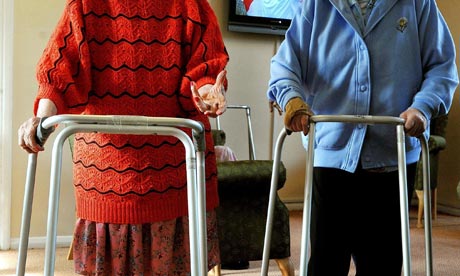
Elderly people who fracture bones after a fall are being let down by the NHS in many parts of the country where treatment and prevention of falls is substandard, according to a major audit.
A report from the Royal College of Physicians (RCP) finds that there are "unacceptable variations" in the quality of care older people receive in England, Wales and Northern Ireland when they fall or are at risk of a fall. In many areas, it says, there is a gap between what the NHS says it provides and the reality.
Falls and hip fractures are a huge reason why the health of elderly people deteriorates and they are unable to remain at home.
Every year, more than 500,000 older people end up in accident and emergency departments after a fall. About 200,000 have fractures owing to osteoporosis, which is treatable. Falls and fractures in the over-65s account for more than 4m bed days a year in England, at an estimated cost of £2bn. Such injuries can cause disability and death.
Guidelines say elderly people who fall should receive prompt treatment, but a third of those with hip fractures do not receive pain relief within an hour of arriving in hospital. There is also inadequate attention to prevention of pressure sores or to early provision of intravenous fluids.
Crucial steps are not taken to prevent falls, the report finds. Every elderly person who has suffered a fracture in a fall should have an assessment to establish how mobile they are and how good their balance is. Almost all primary care trusts claim to do this (94%) but only 34% of those who break their wrist, arm, pelvis or spine are assessed, rising to 72% of those who fracture their hip.
Dr Jonathan Potter, clinical director of the RCP's clinical effectiveness and evaluation unit, which carried out the audit, said it was "starkly apparent that what organisations say they provide is not matched by what people receive".
"Falling and breaking a bone can have serious, life-changing consequences for older people – one of which is that they are much more likely to suffer falls in the future," said Michelle Mitchell, charity director of Age UK, which helped carry out the audit. "It is extremely worrying then that in many areas of the country, people who have already broken bones are not receiving the treatment and support to avoid future injury, including the lack of referral to comprehensive falls prevention services."

